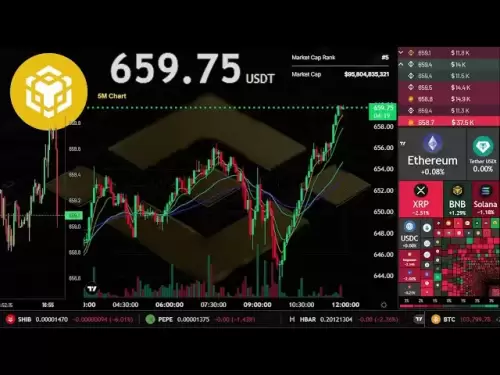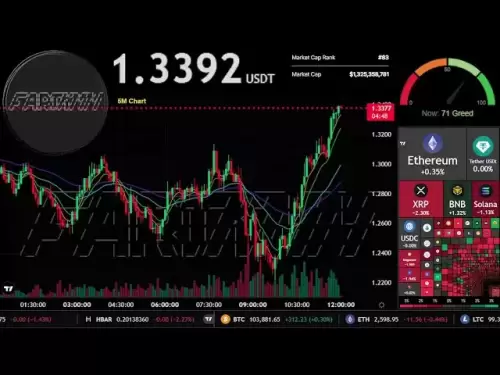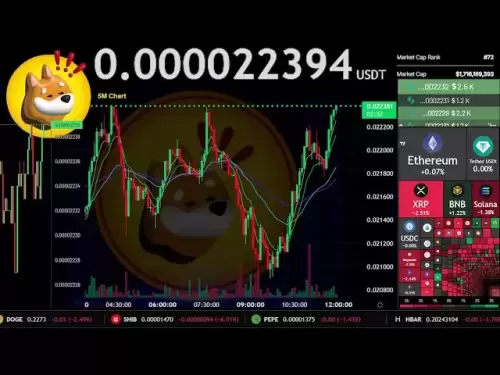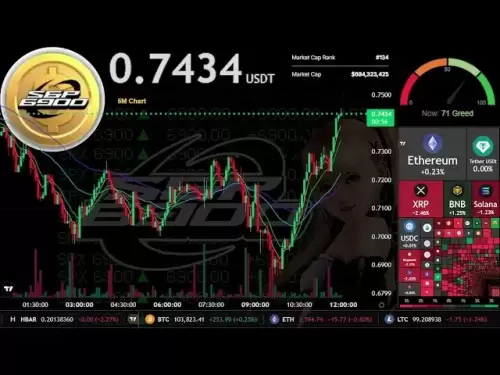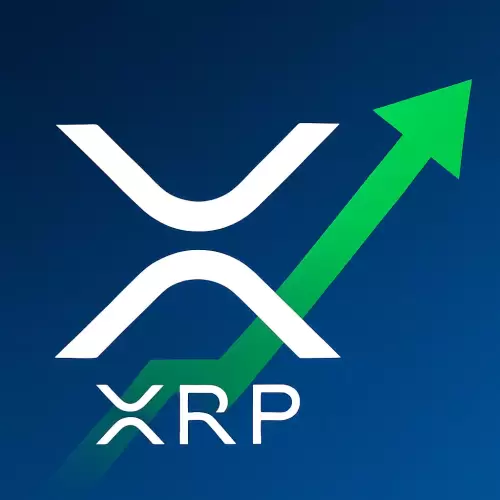 |
|
 |
|
 |
|
 |
|
 |
|
 |
|
 |
|
 |
|
 |
|
 |
|
 |
|
 |
|
 |
|
 |
|
 |
|
Cryptocurrency News Articles
PayPal's Jose Fernandez da Ponte Predicts Banks Will Be the Key to Stablecoin Success
May 16, 2025 at 05:31 am
Seated amidst the futuristic ambiance of Toronto's Consensus 2025 conference, PayPal's voice in digital currencies, Jose Fernandez da Ponte

Seated amidst the futuristic ambiance of Toronto’s Consensus 2025 conference, PayPal's voice in digital currencies, Jose Fernandez da Ponte, dropped an unexpected name in his formula for stablecoin success: banks. The very institutions many see as crypto's antithesis could be pivotal to lifting stablecoins from niche obscurity to mainstream prominence.
Why would stablecoins, the digital marvel designed to bypass traditional finance, need banks? The answer, da Ponte asserts, lies in the robust infrastructure and reliable networks that banks possess. Their intricate webs of custody solutions and fiat on-ramps are crucial for enabling seamless value transfer and greater adoption of stablecoins.
This isn't just speculative thought—it reflects a broader regulatory wave washing over the financial landscape. As U.S. lawmakers inch toward comprehensive stablecoin legislation, guardrails are being set to usher banks into the realm of digital assets. Such legislation can clear the fog of doubt surrounding stablecoins, according to Anthony Soohoo, the CEO of MoneyGram. Consumers and issuers alike question the reliability of these currencies without traditional oversight. Regulation, Soohoo believes, will dissolve these fears, broadening the entryway for new stablecoin issuers in a burgeoning market.
However, amidst this impending infusion of stablecoins, da Ponte tempers expectations. The future won't host hundreds of coins vying for dominance, nor will it see a mere duopoly. Instead, the landscape will evolve through a period of natural selection and consolidation.
Current Market Titans and Emerging Contenders
Today, Tether's USDT and Circle's USDC largely overshadow the stablecoin arena, together contributing a hefty share of the $230 billion pie. In contrast, PayPal's PYUSD trails with a smaller $900 billion supply. But Fernandez da Ponte challenges the narrative that market cap is the defining metric of success. True growth, in his eyes, mirrors the bustling activity within a network—transaction velocity, active wallets, and real-world usage all paint a more comprehensive picture.
In certain regions, where inflation looms large, stablecoins already serve as lif buoys, tethering financial stability to the dependable U.S. dollar. MoneyGram, bridging the gap between cash and crypto, empowers consumers across 200 countries to harness stablecoins for cross-border transactions—a testament to their utility in volatile economic landscapes.
In stark juxtaposition, developed nations have shown more hesitancy. Da Ponte anticipates that with regulatory clarity, stablecoins could streamline treasury operations, eliminating the age-old rush to settle finances before the weekend—a headache turned history through instantaneous digital transactions.
The Future of Stablecoins: Beyond Numbers and Buzzwords
Both visionaries agree: forget the hype. Stablecoins will only thrive through concrete, problem-solving applications. Consumers prioritize solutions over buzzwords—a sentiment da Ponte encapsulates in a forward-looking assessment. Standing five years into a decade-long journey, he emphasizes the pivotal role of pending regulations in shaping the destiny of stablecoins.
The takeaway is clear: while algorithms and innovation drive the world of stablecoins, their acceptance and success could hinge on an unexpected ally—the long-trusted banks.
Will Banks Pioneer the Future of Stablecoins? Surprising Insights from Industry Leaders
Understanding the Role of Banks in Stablecoin Evolution
Stablecoins, designed to offer stability in the volatile crypto market by being pegged to traditional currencies like the U.S. dollar, are seemingly at odds with the conventional banking system. Yet, this apparent contradiction may be the very key to their mainstream adoption. According to Jose Fernandez da Ponte of PayPal, banks provide the robust infrastructure and reliable networks necessary for stablecoin success.
Why Banks Are Essential for Stablecoins
1. Custody Solutions: Banks have experience and infrastructure for secure storage and custody services, ensuring that digital assets, including stablecoins, are safely managed. 2. Fiat On-Ramps: Banks offer seamless fiat on-ramps, allowing easy conversion between cryptocurrencies and traditional currencies, which is essential for user adoption. 3. Regulation and Trust: Banks bring regulatory oversight which can increase consumer trust in stablecoins, addressing concerns over their reliability.
The push towards comprehensive stablecoin legislation in the U.S. aims to integrate banks more closely into the digital asset landscape. This legislation can demystify the stablecoin market, as highlighted by Anthony Soohoo, CEO of MoneyGram, offering clear rules and protections for both issuers and users.
Impact on Issuers: Emerging stablecoin issuers would find it easier to enter the market with a clear regulatory framework, potentially leading to increased competition and innovation. Consumer Trust: Regulation could enhance consumer confidence, a crucial factor for the widespread acceptance and use of stablecoins.
Current Market Leaders and Future Trends
Tether's USDT and Circle's USDC currently dominate the stablecoin space, together holding a significant share of the $230 billion stablecoin market. In contrast, PayPal's PYUSD has a smaller presence with a $90
Disclaimer:info@kdj.com
The information provided is not trading advice. kdj.com does not assume any responsibility for any investments made based on the information provided in this article. Cryptocurrencies are highly volatile and it is highly recommended that you invest with caution after thorough research!
If you believe that the content used on this website infringes your copyright, please contact us immediately (info@kdj.com) and we will delete it promptly.
-

-

- XRP Priced in West Texas Intermediate Crude (USOIL) Is a Leading Indicator of Its Price Action
- May 16, 2025 at 01:50 pm
- Independent market technician Dom (@traderview2) has drawn the crypto community’s eye to an unconventional but increasingly watched ratio: XRP priced in West Texas Intermediate crude.
-

-

-

-

-

-

- Coinbase, the largest virtual asset exchange in the United States, was hacked and major customer information was leaked.
- May 16, 2025 at 01:35 pm
- According to major foreign media such as Bloomberg on the 15th (local time), Coinbase told U.S. regulators that its system was hacked and customer data was stolen.
-




















